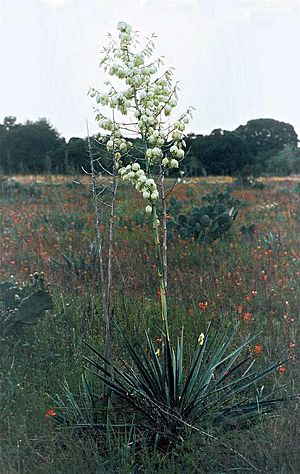Coahuila soapwort facts for kids
Quick facts for kids Coahuila soapwort |
|
|---|---|
 |
|
| Conservation status | |
| Scientific classification |
The Yucca coahuilensis, also known as the Coahuila soapwort, is a cool plant from the Asparagaceae family. You can find it growing in the grassy areas of southern Texas and northern Coahuila, which is a state in Mexico. This plant is special because it has stiff, narrow leaves that grow in a circle close to the ground. It also grows a tall stalk, sometimes as high as 2.5 meters (about 8 feet), with pretty creamy white flowers on top.
Contents
What is a Yucca Plant?
Yucca plants are a type of plant that often grows in dry, sunny places. They are known for their tough, sword-shaped leaves. Many yucca plants have tall flower stalks that stand out in the landscape. They are well-adapted to their environments.
Where Does Coahuila Soapwort Grow?
The Coahuila soapwort loves open spaces like grasslands. It grows naturally in parts of Texas and Coahuila, Mexico. These areas often have warm weather and not too much rain. The plant is tough and can handle these conditions.
Its Home in Texas and Mexico
In Texas, you might find it in the southern regions. In Mexico, it's found in the northern state of Coahuila. These areas are part of its native habitat. This means it has grown there for a very long time.
What Does It Look Like?
This yucca plant has a unique look. Its leaves are long and thin, like blades of grass, but much stiffer. They form a tight group at the base of the plant.
Leaves and Flowers
The leaves are very narrow and strong. They help the plant save water. When it's time to bloom, a tall stem shoots up from the center. This stem can reach impressive heights. At the top of this stem, you'll see many creamy white flowers. These flowers are often bell-shaped.
Why Are Yucca Plants Important?
Yucca plants, including the Coahuila soapwort, play an important role in their ecosystems. They provide food and shelter for different animals. Their flowers attract pollinators like moths and bees.
Pollination by Moths
Many yucca plants have a special relationship with yucca moths. The moths help the plant make seeds. In return, the plant provides a safe place for the moth's eggs. This is a great example of teamwork in nature.
Habitat for Wildlife
The tough leaves and sturdy structure of yucca plants can offer protection. Small animals might use them for shelter. Birds might perch on their tall stalks.
Conservation Status
The Coahuila soapwort is listed as "Vulnerable" (VU) by the IUCN. This means it faces a high risk of becoming endangered in the wild. Protecting its habitat is very important.
What Does "Vulnerable" Mean?
When a plant or animal is "Vulnerable," it means its population is decreasing. It might be facing threats like habitat loss. Scientists keep an eye on these species to help protect them.
How Can We Help?
Learning about plants like the Coahuila soapwort is a first step. Supporting efforts to protect natural grasslands helps these plants survive. Every plant plays a part in keeping our planet healthy.
See also
 In Spanish: Yucca coahuilensis para niños
In Spanish: Yucca coahuilensis para niños


